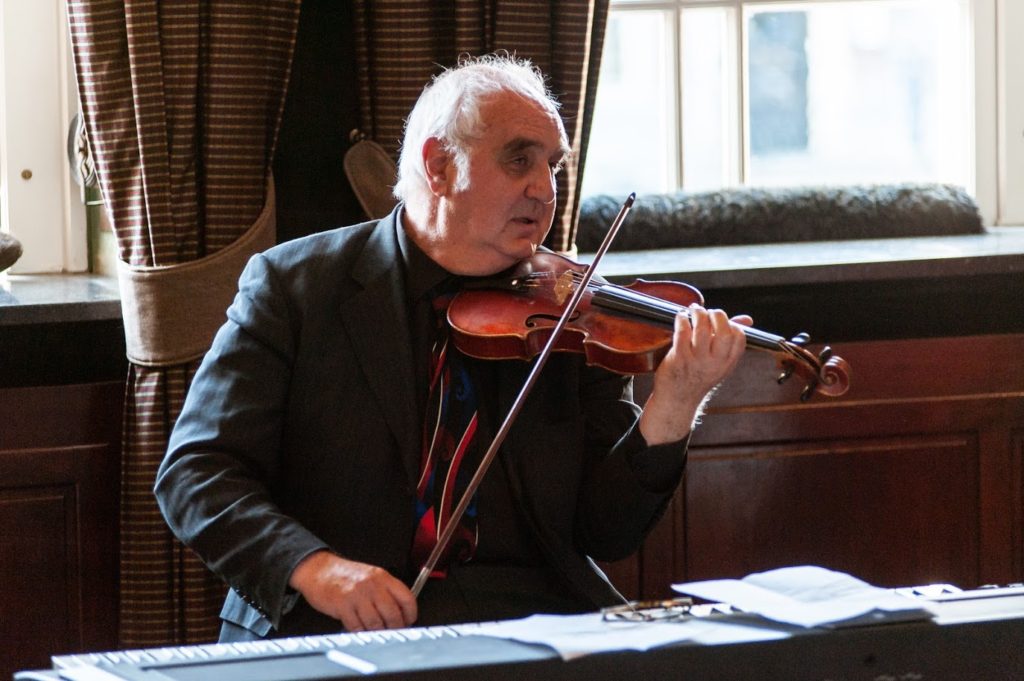Saturday October 23rd our Autumn Meeting took place in Amsterdam! Within the context of the CSS theme beauty, we welcomed Joan Berkhemer as our guest, a prominent violinist and composer associated with the Mokum Symphony. In what was both a lecture and a home concert, he showed how the way music is made is influenced by the Zeitgeist.
Click here to view the vlog we made of the event! Scroll down for a report of what has been discussed!
What did we discuss?
How does musical experience change over time? What is the influence of the spirit of the times, what can be attributed to the unchanging human condition? What goes, what stays? Those are the big questions that were discussed this afternoon. We focused in particular on the transition from pre-war to post-war classical music, the transition from a freer, more emotional musical experience to more formal modes of performing.
When we listen to historical recordings, such as the first recordings of Beethoven from the 19th century, we hear that music was played very differently than it is today, with looser rhythms and a great sense of drama and emotion. In fact, Beethoven himself played his own music much more freely, with sometimes 26 changes in tempo in one piece. One can also consider recordings of pre-war performers such as the great soprano Elisabeth Schumann and the Irish baritone Henry Plunket. By making small changes in tempo, slowing down or speeding up the music at suitable times, this music brings new emotions to life.
An important component in this freer, more romantic music was the close connection between instrumental music and singing – people played the way they sang. When you hear voices from the time of the first sound recordings, you will immediately notice the difference with the current age: people spoke differently, people sang differently. Recordings of a speech by Colijn, the folk singer Bob Scholte, and the tenor Joseph Schmidt may illustrate this. You can hear, for example, how playing was connected with singing in a duet by tenor Enrico Caruso and violinist Mischa Elman. In their Élégie you can hear the same sensitivity, the same freedom of timing, and a vocal and violin technique aimed at connecting and coloring notes.
This style of play changed after the Second World War. Contemporary music has become characterized by the absence of tempo changes: performances perfectly match a metronome. Changes in tempo are now considered to be lazy and opposed to the intention of the composer. Furthermore, the link between the vocals and instrumental music is no longer self-evident – emotion is supposed to come from the music itself, and is less connected to the vocals. Accordingly, although musical performance has become “tighter” as a result, it may also have lost some of its humanity. In the meantime, this new style is no longer just a matter of preference: the knowledge and skills required for the pre-war style of performing have been virtually lost in the Netherlands.
What may we conclude?
After the Second World War, a changing Zeitgeist formalized musical practice, which led to a loss of emotion in music. However, this has not been an inevitable process and does not have to be irreversible. Berkhemer’s Mokum Symphony tries to bring change and finds inspiration in the pre-war way of playing. It is not his intention to introduce new, rigid dogmatics or to make music exactly as it was a hundred years ago—after all, you cannot turn back the clock. He does, however, try to enrich modern music life with insights from that period. This is quite possible—in other art forms, such as poetry and architecture, artists have also successfully reintroduced elements from the past. Berkhemer’s own piano playing ultimately confirmed this, in his inspired and clear performance of Beethoven’s Moonlight sonata. In this way Berkhemer demonstrated not only in his presentation, but also in his playing, that the formula he and his Mokum Symphony have chosen works, and enriches the Dutch music scene.





